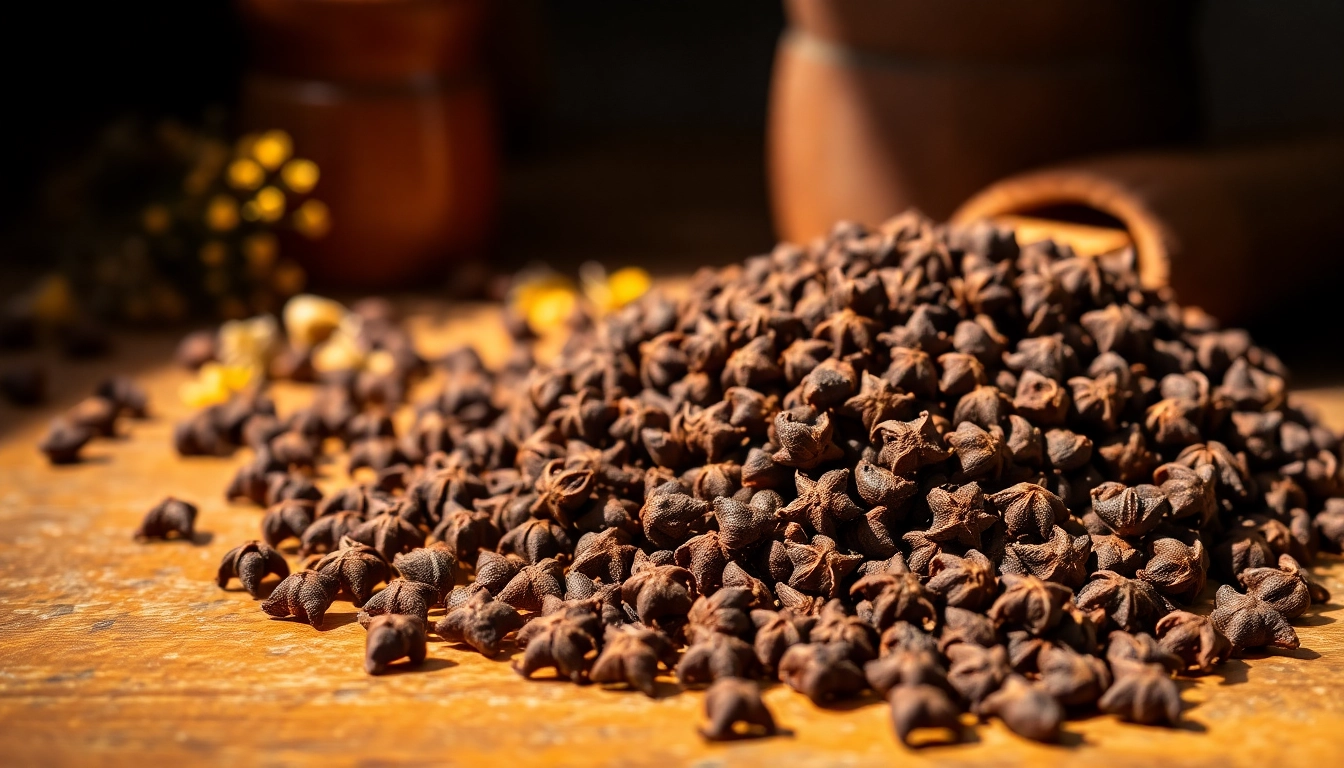Health Benefits and Culinary Uses of Cloves: A Comprehensive Guide
What Are Cloves? Understanding the Spice
Cloves are the aromatic flower buds of a tree in the family Myrtaceae, specifically from the species Syzygium aromaticum. Native to the Maluku Islands in Indonesia, these dried flower buds have been prized throughout history not only for their flavor but also for their medicinal properties. Their unique flavor profile, characterized by a warm, sweet, and slightly bitter taste, makes them a staple in many culinary traditions around the world. Today, cloves are used in a variety of applications, from cooking and baking to health remedies and cosmetics. This article explores the fascinating characteristics of cloves, their nutritional benefits, and their culinary uses, along with potential health implications.
Origin and Characteristics of Cloves
The clove tree is a tropical evergreen that can grow up to 8-12 meters high, characterized by its green foliage and reddish-brown flower buds. The buds are harvested before they bloom, which is when they possess their most intense flavor. Cloves have a distinct aroma that can often be described as spicy and sweet, with hints of warmth that come from their essential oils. The primary aromatic compound found in cloves is eugenol, which is responsible for their unique scent and flavor. Historically, cloves were traded along the Silk Road and were once considered as valuable as gold. Their rarity and the labor-intensive process of harvesting contributed to their high market value.
Types of Cloves and Their Flavors
There are several varieties of cloves, but the most commonly used in cooking are the S. aromaticum, known as “Whole Cloves” or “Clove Buds”. The two primary types include:
- Indonesian Cloves: Often referred to as “Java” or “Bali” cloves, these tend to be stronger in flavor and aroma, making them a popular choice for culinary uses.
- Malagasy Cloves: Grown primarily in Madagascar, these cloves are known for their milder flavor and slightly sweeter notes.
The flavor of cloves can vary significantly depending on the type and origin, as well as how they are processed. Freshly ground cloves tend to have a stronger and more complex flavor compared to whole cloves, which lose their potency over time.
How Cloves Are Harvested and Processed
The harvesting of cloves is a meticulous process. The flower buds are picked by hand at a specific stage before they turn yellow. After harvesting, the buds are left to dry in the sun, which enhances their flavor and aroma. Once dried, they can be stored for extended periods without losing their essential oils. The moisture content is crucial, as excess moisture can lead to mold, wasting the valuable aromatic properties. Proper storage in a cool, dark place in airtight containers further preserves their freshness.
The Nutritional Profile of Cloves
Cloves are more than just a flavor enhancer; they are packed with essential nutrients and beneficial compounds that contribute to various health benefits. A small quantity of cloves can offer a significant amount of vital nutrients.
Important Nutrients Found in Cloves
Despite their small size, cloves are rich in vitamins and minerals. They contain:
- Manganese: Essential for bone health, metabolism, and enzyme function.
- Vitamin K: Plays a crucial role in coagulation and bone health.
- Calcium: Important for bone structure and function.
- Magnesium: Involved in numerous biochemical reactions in the body.
- Fiber: Supports digestive health and can aid in maintaining healthy bowel movements.
Adding cloves to your diet can enhance your overall nutrient intake while providing flavorful benefits.
Cloves and Their Antioxidant Properties
Cloves are known to be a powerhouse of antioxidants, including eugenol, which contributes significantly to their protective qualities against oxidative stress. Antioxidants help neutralize free radicals in the body, which can cause cellular damage and lead to chronic diseases such as heart disease and cancer. Regular incorporation of cloves in the diet may help minimize the risk of such health issues by boosting the body’s defense mechanisms.
Impact of Cloves on Health and Wellness
The potential health benefits of consuming cloves extend beyond their nutritional content. Research suggests that cloves may contribute to:
- Improved blood sugar control: Cloves may help regulate blood sugar levels, making them beneficial for individuals with diabetes.
- Enhanced liver function: The antioxidants in cloves may support liver health by reducing enzyme levels associated with liver damage.
- Anti-inflammatory effects: Through their active compounds, cloves may reduce inflammation, which is linked to various chronic diseases.
Culinary Uses of Cloves
Cloves are incredibly versatile in the culinary realm. They can be used whole or ground, depending on the desired flavor intensity. Their robust flavor allows them to complement various ingredients in both sweet and savory dishes.
Incorporating Cloves into Cooking
When using cloves in cooking, there are a few tips to keep in mind to maximize their flavor:
- Whole Cloves: These can be added to stews, braises, or rice dishes to infuse flavor; remember to remove them before serving.
- Ground Cloves: Ideal for baking, ground cloves can enhance spice blends for cookies, cakes, and pies. A little goes a long way due to its potent flavor.
- Infused Clove Oil: Can be made by steeping whole cloves in olive or coconut oil, providing a fragrant base for dressings or marinades.
Traditional Dishes Featuring Cloves
Cloves are integral to many traditional dishes worldwide, including:
- Gingerbread: Cloves add depth to the warm spice mix in gingerbread cookies.
- Indian Biryani: Whole cloves enhance the aroma and complexity of this fragrant rice dish.
- Mulled Wine: Cloves are a key ingredient in the spice blend used to make mulled wine, providing warmth during winter festivities.
Beverages Enhanced by Cloves
Cloves can enrich beverages as well, contributing both flavor and health benefits:
- Chai Tea: This beloved Indian beverage often features cloves among its spices, delivering a rich and aromatic experience.
- Clove-Infused Hot Chocolate: Adding a dash of ground cloves can transform ordinary hot chocolate into a warming, spiced treat.
- Clove Water: Steeping whole cloves in water can create a detoxifying drink that promotes digestion and overall wellness.
Health Benefits of Cloves
The consumption of cloves has been linked to numerous health benefits, making them a valuable addition to any diet. Below, we explore some of the primary benefits associated with cloves and how they can contribute to overall health.
Cloves for Digestion and Gut Health
Cloves have been traditionally used to aid digestion. Their natural properties may help alleviate common digestive issues, such as gas, bloating, and indigestion. Clove oil is particularly known for its potential to reduce inflammation in the gut and stimulate the production of digestive enzymes. Incorporating cloves into meals may promote better digestion, making it a smart choice for those with sensitive stomachs.
Cloves and Their Role in Oral Health
Due to their antiseptic and anti-inflammatory properties, cloves are often used in dental care. They can be an effective remedy for toothache and gum disease. Clove oil is commonly recommended for use as a topical treatment due to its ability to numb pain and combat bacteria in the mouth. Incorporating cloves into oral health routines can mitigate some common issues.
Potential Anti-Inflammatory Benefits of Cloves
Chronic inflammation is associated with various health conditions, including heart disease and arthritis. Cloves, rich in eugenol, hold potential anti-inflammatory properties that may help reduce inflammation throughout the body. Regular consumption, whether through cooking or as a supplement, might contribute positively to overall health by combating chronic inflammation.
Precautions and Potential Side Effects of Cloves
While cloves are largely beneficial, it is essential to consider potential precautions and side effects associated with their consumption.
Who Should Avoid Cloves?
Certain individuals may need to be cautious when using cloves, particularly in concentrated forms, such as clove oil:
- Pregnant and breastfeeding women: It is advised to limit clove usage as it can stimulate uterine contractions.
- Individuals with bleeding disorders: Cloves can impact blood clotting and should be used with caution.
Interactions with Medications
Clove oil may interact with certain medications, particularly blood thinners. Those taking anticoagulants should consult with a healthcare provider to avoid complications. Additionally, cloves may impact blood sugar levels, necessitating care among diabetics.
Safe Consumption Guidelines
To safely enjoy cloves in your diet:
- Stick to moderate amounts when using whole or ground cloves in recipes.
- Avoid overconsumption of clove oil; consult with a healthcare provider for appropriate dosages.
- Monitor your body’s response when introducing cloves into your diet for the first time.
Overall, cloves are a remarkable spice that not only adds depth of flavor to various dishes but also offers a wealth of health benefits. Whether you’re experimenting with cloves in your cooking or considering them for their medicinal properties, understanding their potential and usage is essential to reaping all that they have to offer.










Post Comment